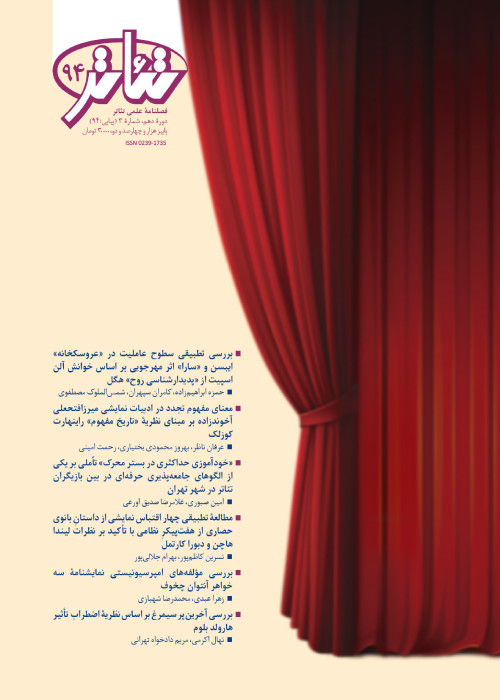Fragmented Writing, Modern Attempts, Postmodern Approaches; Contexts, elements, methods, influences and challenges of fragmented drama writing
Author(s):
Abstract:
During the past three decades the fragmented writing style has developed as a literary breed and has turned into a symbol of the contemporary era and its calamities. Theatrical writing has not been an exception to this, as it has had a lot to offer to the worlds literary and artistic treasury in the form of various novel experiences. That is why, this research has found it inevitable to investigate the roots, methods, structural elements and semantic implications of fragmented writing, as an artistic practice symptomatic of our times. The research asks questions such as: what was the causes of diminishing the old, consistent aesthetics of 'Aristotle's Rhetoric' and replaced it by fragmented writing? Who are the effective individuals and movements that have led this transition in the theatre realm? What are the specific features and aims of fragmented writing aesthetics, as an alternative to the Aristotelian one? Considering the questions presented above, and despite the lack of much solid theoretical resources on the fragmented writing aesthetics specially in theatre and certainly in Persian language this research attempts to provide a structured framework on the definition, evolutional trajectory, influences, opportunities and challenges of fragmented writing method. For this, the research seeks to illustrate the relationship between fragmented writing to its contemporary philosophical trend Pluralism. Further, the study endeavors to explicate the emergence of the fragmented writings historical and social context as an aesthetic style and identify its theoretical framework. Moreover, this study tries to clarify the terminological and implicational difficulties of the concept of the fragmented writing and particularly one of its important and basic arguments namely the differentiation between the "modern fragmented writing'" and the "postmodern fragmented writing". Last, the fragmented writing historical trajectory of evolution within the theatrical sphere is discussed and eventually in the final part of the paper, some of its aesthetic influences, opportunities and challenges are addressed. The research findings demonstrate that a collection of political, social, economic, etc. motives which have caused the consistent and definite image of self, reality and truth become fragmented and scattered, known as Pluralism in the postmodern era have provided fertile grounds for the fragmented writing to become the main and dominant form of writing in this period. This type of writing, as shown by this study, is the best translation and carrier of what is generally known as sharing in art in contemporary cultural milieus.
Keywords:
Language:
Persian
Published:
Theater, Volume:3 Issue: 65, 2017
Page:
89
magiran.com/p1657686
دانلود و مطالعه متن این مقاله با یکی از روشهای زیر امکان پذیر است:
اشتراک شخصی
با عضویت و پرداخت آنلاین حق اشتراک یکساله به مبلغ 1,390,000ريال میتوانید 70 عنوان مطلب دانلود کنید!
اشتراک سازمانی
به کتابخانه دانشگاه یا محل کار خود پیشنهاد کنید تا اشتراک سازمانی این پایگاه را برای دسترسی نامحدود همه کاربران به متن مطالب تهیه نمایند!
توجه!
- حق عضویت دریافتی صرف حمایت از نشریات عضو و نگهداری، تکمیل و توسعه مگیران میشود.
- پرداخت حق اشتراک و دانلود مقالات اجازه بازنشر آن در سایر رسانههای چاپی و دیجیتال را به کاربر نمیدهد.
In order to view content subscription is required
Personal subscription
Subscribe magiran.com for 70 € euros via PayPal and download 70 articles during a year.
Organization subscription
Please contact us to subscribe your university or library for unlimited access!


